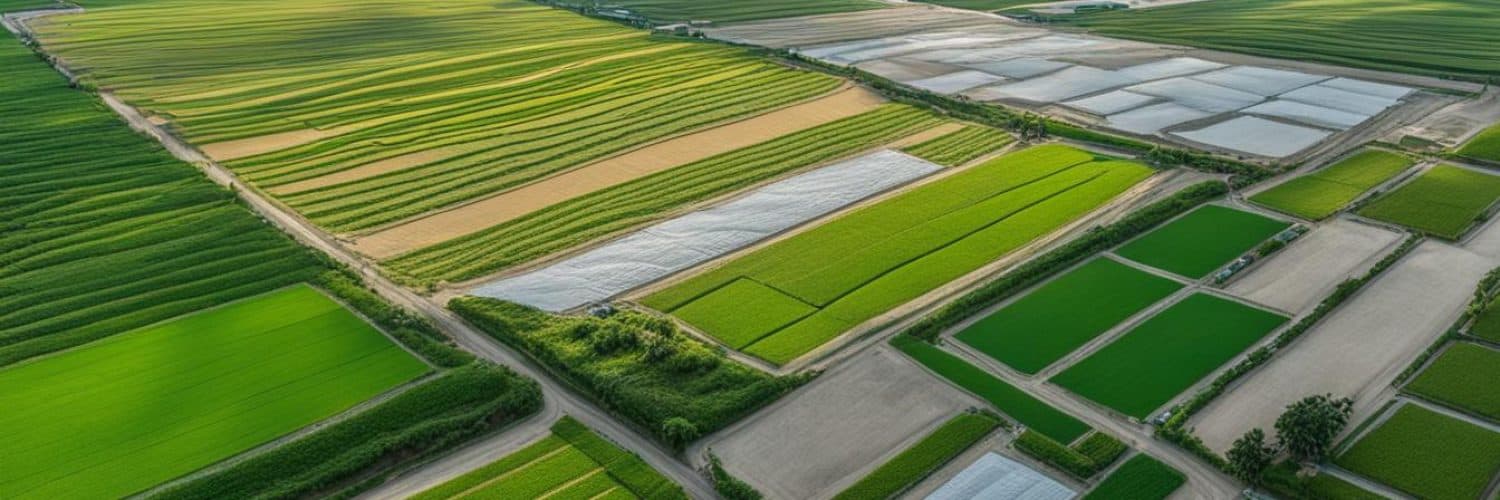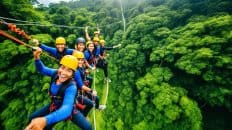Welcome to Jiabong Agro-Industrial Park, located in Samar, Philippines. This thriving agro-industrial zone is known for its vibrant agro-based industries, offering numerous investment opportunities in the agriculture sector. Whether you are an investor looking for a promising venture or someone passionate about agribusiness, this park is the ideal destination for you.
Jiabong Agro-Industrial Park, also referred to as the Jiabong Industrial Estate, covers a vast area and plays a crucial role in the Philippine industrial development. With its strategic location and favorable climatic conditions, it creates a fertile ground for agro-based industries to flourish and thrive.
Key Takeaways:
- Jiabong Agro-Industrial Park in Samar, Philippines offers significant investment opportunities in the agriculture sector
- It is a vibrant hub for agro-based industries and is known for its thriving agribusiness
- The park covers a vast area and is strategically located, contributing to the Philippine industrial development
- With its favorable climate and fertile land, Jiabong Agro-Industrial Park is an attractive destination for agriculture investments
- Investing in the park can contribute to the economic development of Samar and support the growth of the agro-industrial sector in the Philippines
Location and Overview of Jiabong
Jiabong Agro-Industrial Park is situated in the mesmerizing province of Samar in the picturesque Eastern Visayas region of the Philippines. Nestled in the city of Jiabong, this park is renowned for its thriving agro-based industries, offering endless investment opportunities in the agriculture sector.
The park spans across an expansive area of XX square kilometers, strategically positioned in close proximity to major road networks. This prime location ensures convenient accessibility to various municipalities and neighboring provinces, making it an ideal destination for agro-business ventures.
Jiabong Agro-Industrial Park is a thriving agro-industrial zone, often referred to as the Jiabong industrial estate. With its lush vegetation and stable economy, this park presents an excellent prospect for investors seeking new avenues in the agricultural landscape.
The Splendor of Jiabong
Surrounded by breathtaking natural beauty, Jiabong captivates visitors with its enchanting landscapes and warm hospitality. The region’s verdant rice fields, sprawling coconut plantations, and cascading waterfalls create a picturesque backdrop for agro-industrial endeavors.
“Jiabong Agro-Industrial Park is not only a gateway to investment opportunities but also a scenic haven that offers a unique blend of business potential and natural wonders.” – Local Business Owner
Investment Opportunities in Jiabong
Jiabong Agro-Industrial Park presents a wealth of investment opportunities in the agriculture sector. From agribusiness ventures to tourism enterprises, there is immense potential to explore and contribute to the sustainable growth of this agro-industrial hub.
Investors can partake in various agricultural activities, such as crop cultivation and livestock farming, benefiting from the region’s fertile land and abundant natural resources.
As an agro-industrial zone with close proximity to business districts and major thoroughfares, Jiabong Agro-Industrial Park offers a favorable environment for investors to establish their operations.
Furthermore, the park thrives on the continued support of local government units, providing access to training and capacity-building programs that enhance the investment prospects for agriculture-based businesses.
Investment Opportunities in Jiabong Agro-Industrial Park
| Investment Opportunities | Description |
|---|---|
| Agribusiness | Opportunities to engage in crop cultivation and livestock farming, capitalizing on the region’s fertile land. |
| Tourism | Investment possibilities in hospitality facilities, eco-tourism ventures, showcasing the natural beauty of Jiabong. |
Investment opportunities in Jiabong Agro-Industrial Park are as diverse as the region itself. With the perfect blend of favorable location, natural resources, and government support, Jiabong beckons investors to embark on an exciting journey in the thriving agro-industrial sector.
Stay tuned for the next section as we delve deeper into the investment potential of Jiabong Agro-Industrial Park!
Investment Opportunities in Jiabong Agro-Industrial Park
Jiabong Agro-Industrial Park presents abundant investment opportunities in the agriculture sector. The park is a thriving hub for various agro-based industries, including crop cultivation and livestock farming. With its fertile land and abundant natural resources, Jiabong offers an ideal environment for agricultural activities, making it a promising destination for investors seeking agriculture investments in the Philippines.
Investors can explore a range of businesses in Jiabong Agro-Industrial Park, such as agribusiness, tourism, and hospitality facilities. The park’s strategic location, proximity to business districts, and accessibility via major thoroughfares contribute to its potential for attracting investors and generating employment opportunities.
Local government units provide support to investors in Jiabong Agro-Industrial Park, ensuring a favorable investment climate. Additionally, training and capacity-building programs are available to enhance investors’ knowledge and skills in agro-based industries.
By capitalizing on the investment opportunities in Jiabong Agro-Industrial Park, investors can contribute to the growth of agro-based industries in Samar, Philippines, while reaping the rewards of a fruitful and sustainable investment.
Agricultural Lot for Sale in Samar
When it comes to exploring the investment opportunities in Jiabong Agro-Industrial Park, one area that stands out is the availability of agricultural lots for sale in Samar. These lots provide investors with the opportunity to own land that is specifically suitable for various agricultural activities. Samar, with its favorable location and well-connected road network, offers an ideal environment for agri-business ventures.
One platform that offers a wide selection of agricultural lots for sale in Samar is Lamudi. Potential investors can browse through a diverse range of properties with different sizes, locations, and amenities to find the perfect fit for their specific requirements. Prices of agricultural lots may vary based on these factors.
| Lot Size | Location | Amenities | Price Range |
|---|---|---|---|
| 1 hectare | Jiabong Industrial Estate | Water and electricity connections | $50,000 – $70,000 |
| 2 hectares | Nearby town with easy access to the park | Nearby markets and transportation hubs | $100,000 – $150,000 |
| 5 hectares | Scenic location with mountain views | Existing farm structures and equipment | $200,000 – $300,000 |
By investing in an agricultural lot in Samar, investors can tap into the immense potential of the thriving agro-industrial sector in Jiabong Agro-Industrial Park. Whether it’s crop cultivation, livestock farming, or other agri-business ventures, Samar provides the perfect backdrop for success in the agriculture industry.
The Green Mussel Industry of Samar
The green mussel industry plays a significant role in the agricultural sector of Samar and Jiabong Agro-Industrial Park. Green mussels, also known as Perna viridis, are a major product of Samar and are supplied to various markets in the Philippines, including Manila, Cebu, and Davao. The industry has provided employment opportunities for local residents and has contributed to the economic development of the region. The mussel farms are located in Maqueda Bay, Villareal Bay, and Cambatutay Bay, which are all part of Jiabong Agro-Industrial Park. The industry has faced challenges in recent years, including factors like sediment accumulation and poor water circulation. However, efforts are being made to enhance farming practices and promote sustainable methods to ensure the industry’s long-term viability.
Profile of Green Mussel Farmers in Samar
A study conducted on the green mussel industry in Samar provides valuable insights into the profile of green mussel farmers in the region. The survey collected data from 1,043 households involved in green mussel farming, post-production, and selling. The findings shed light on the characteristics and demographics of these farmers, offering a deeper understanding of the industry’s dynamics.
The study reveals that the average age of green mussel farmers in Samar is 47.02 years, with a standard deviation of 8.83 years. This indicates an experienced and mature workforce contributing to the sustainable growth of the green mussel industry.
“The average age of green mussel farmers in Samar is 47.02 years, with a standard deviation of 8.83 years.”
Villareal stands out as the leading area for green mussel farming, accounting for 58.10% of the surveyed households. It is followed by Maqueda Bay with 32.89% and Cambatutay Bay with 9.01% of the farming households. These geographical concentrations highlight the specific regions where the green mussel industry thrives within the Jiabong Agro-Industrial Park.
The educational attainment among green mussel farmers in Samar varies, with primary school to college graduates populating the industry. The majority of farmers have a secondary-level education, indicating a solid foundation of knowledge and skills necessary for successful farming practices.
“The educational attainment of green mussel farmers in Samar ranges from elementary to college graduate, with a strong presence of farmers with secondary-level education.”
The study emphasizes the importance of promoting the green mussel industry and encouraging the participation of younger individuals. By attracting new generations to take up farming, the industry can ensure its long-term sustainability, fostering innovation and growth within the Jiabong Agro-Industrial Park.
Key Findings:
- The average age of green mussel farmers in Samar is 47.02 years, with a standard deviation of 8.83 years.
- Villareal has the highest number of green mussel farmers, accounting for 58.10% of the surveyed households.
- The educational attainment of green mussel farmers varies, with the majority having secondary-level education.
- Promoting the green mussel industry among younger generations is crucial for its future sustainability and growth.
Green Mussel Farming Practices
The farming practices employed by green mussel farmers in Samar have undergone significant changes over the years. A study on mussel farming in the region revealed interesting trends and emphasized the importance of adopting environmentally friendly methods for long-term sustainability of the industry.
The traditional method of staking, which involves placing mussels on bamboo stakes, has become less popular among farmers. Instead, there has been an increasing number of farmers adopting the bamboo-tray module method. This method involves placing mussels in trays made of bamboo, providing a stable and controlled environment for growth.
It is crucial to adopt newer and more sustainable farming practices to ensure the continued success of the green mussel industry in Samar. These practices not only contribute to the preservation of the environment but also enhance the overall efficiency and productivity of the farms.
Research has shown that farmers who have attended training and capacity-building activities specifically focused on green mussel farming are more likely to adopt improved and sustainable farming practices. These activities provide farmers with valuable knowledge and skills, empowering them to make informed decisions about their farming methods.
By embracing environmentally friendly practices and staying updated with the latest advancements in mussel farming techniques, green mussel farmers in Samar can contribute to the industry’s growth and success, ultimately benefiting Jiabong Agro-Industrial Park and the local economy.
| Farming Method | Popularity |
|---|---|
| Staking Method | Decreasing |
| Bamboo-Tray Module Method | Increasing |
Level of Awareness and Technology Adoption
The study conducted on the green mussel farmers in Samar also examined the level of their awareness and adoption of technology in mussel farming. The results revealed that approximately one-third of the farmers had received training or participated in capacity-building activities related to green mussel farming and management. These programs have significantly contributed to their knowledge and understanding of advanced farming techniques and sustainable practices.
However, the study also highlighted that a majority of the farmers in Samar had limited exposure to such training programs and were unaware of the latest technological advancements in the industry. This lack of awareness and access to technical knowledge hindered the adoption of newer and more efficient farming technologies.
In order to foster sustainable growth in the green mussel industry and enhance the productivity of mussel farms, there is a pressing need to increase the level of awareness among farmers and provide them with adequate technical support. This can be achieved through organized training programs, workshops, and the dissemination of information on innovative farming techniques and best practices.
“Increasing awareness and providing technical support to farmers are crucial steps towards encouraging the adoption of newer and more sustainable farming technologies in the green mussel industry. By equipping farmers with the necessary knowledge and resources, we can promote environmentally friendly practices and ensure the long-term viability of mussel farming in Samar.”
Promoting Environmental Sustainability
One of the key objectives of enhancing awareness and technology adoption in mussel farming is to promote environmental sustainability. Green mussel farming heavily relies on the natural resources and ecosystems of Samar, and it is essential to implement practices that minimize environmental impact and preserve the delicate balance of the marine ecosystems.
By adopting newer technologies and practices, such as the use of eco-friendly aquaculture systems, farmers can reduce the negative effects on water quality, sediment accumulation, and marine biodiversity. Additionally, implementing sustainable farming methods can improve overall farm productivity, increase the quality of mussel harvests, and ensure the industry’s long-term profitability.
Understanding Policies and Regulations
Another aspect of promoting technology adoption in mussel farming is enhancing the understanding of policies and regulations related to the green mussel industry. Familiarizing farmers with government guidelines, environmental regulations, and quality standards is essential for ensuring compliance and maintaining the industry’s reputation.
Through training and capacity-building activities, farmers can gain a comprehensive understanding of the legal framework and requirements that govern green mussel production. This knowledge will enable them to make informed decisions and adopt practices that align with existing policies, contributing to greater industry sustainability and market competitiveness.
Challenges and Opportunities
While there are challenges in increasing awareness and technology adoption among green mussel farmers, there are also significant opportunities for growth and innovation. By investing in research and development, industry stakeholders can explore new techniques, such as precision aquaculture and remote sensing, that can revolutionize mussel farming practices.
Furthermore, collaboration between government agencies, research institutions, and industry players can facilitate the transfer of knowledge and promote the adoption of technological advancements. This collaborative approach will create a conducive environment for farmers to embrace change, enhance their productivity, and contribute to the sustainable growth of the green mussel industry in Samar and Jiabong Agro-Industrial Park.
| Challenges | Opportunities |
|---|---|
| Limited awareness among farmers | Research and development for innovative farming practices |
| Lack of technical support | Collaborative initiatives to transfer knowledge |
| Inadequate understanding of policies and regulations | Market competitiveness through compliance |
Conclusion
Jiabong Agro-Industrial Park in Samar, Philippines, is a thriving hub of agro-based industries and a promising investment opportunity in the agriculture sector. With its favorable location and fertile land, the park offers an ideal environment for agribusiness ventures. Investors looking to capitalize on the agricultural potential of Samar will find a range of opportunities in Jiabong Agro-Industrial Park.
The green mussel industry, which is a key component of the park, has faced challenges in recent years. However, efforts are underway to enhance farming practices and promote sustainable methods. This industry contributes to the economic development of Samar and attracts business to the agro-industrial sector. By investing in the park, investors can support the growth of the green mussel industry and contribute to the overall development of Samar.
Jiabong Agro-Industrial Park presents a unique opportunity for those interested in the agroindustry and agricultural investments in Samar, Philippines. The combination of thriving agro-based industries, fertile land, and ongoing efforts to support the green mussel industry make this park an attractive destination for investors. With its strategic location and potential for economic growth, Jiabong Agro-Industrial Park is poised to become a key player in the Philippine agricultural sector.
FAQ
What is the Jiabong Agro-Industrial Park?
Jiabong Agro-Industrial Park is a vibrant agro-industrial zone located in Samar, Philippines. It offers numerous investment opportunities in agro-based industries and agriculture.
Where is Jiabong Agro-Industrial Park located?
Jiabong Agro-Industrial Park is located in the province of Samar, in the Eastern Visayas region of the Philippines.
What investment opportunities are available in Jiabong Agro-Industrial Park?
Jiabong Agro-Industrial Park offers a wide range of investment opportunities in the agriculture sector, including agribusiness and tourism.
Are there agricultural lots for sale in Samar?
Yes, there are agricultural lots for sale in Samar, providing investors with the opportunity to own land suitable for various agricultural activities.
What is the green mussel industry in Samar?
The green mussel industry in Samar is a significant component of the agricultural sector, with green mussels being a major product supplied to various markets in the Philippines.
What is the profile of green mussel farmers in Samar?
A study conducted on green mussel farming in Samar revealed that the average age of farmers is 47.02 years, with varying levels of educational attainment.
What are the farming practices employed by green mussel farmers in Samar?
Green mussel farmers in Samar have shifted from the staking method to the bamboo-tray module method, which is considered more favorable.
What is the level of awareness and technology adoption among green mussel farmers in Samar?
Approximately one-third of green mussel farmers in Samar have received training or participated in capacity-building activities related to green mussel farming and management.
What is the conclusion of Jiabong Agro-Industrial Park and the green mussel industry in Samar?
Jiabong Agro-Industrial Park offers significant investment opportunities in agriculture, and the green mussel industry in Samar is being enhanced through efforts to promote sustainable farming practices.


















Add comment